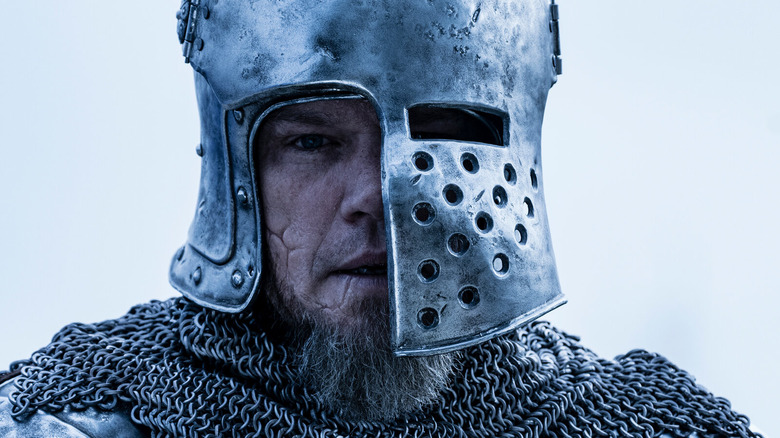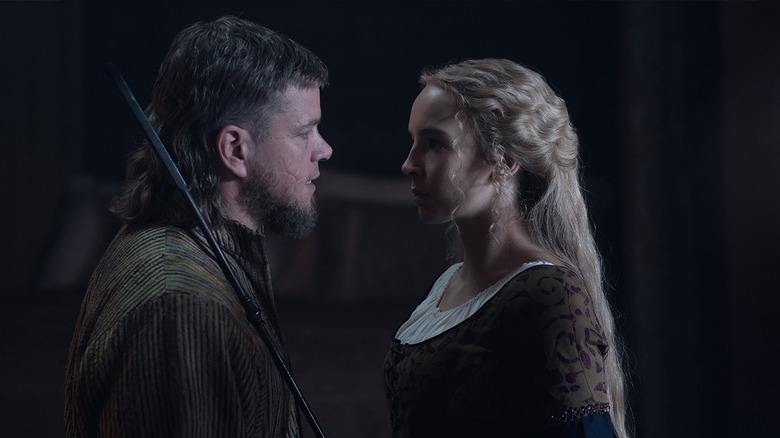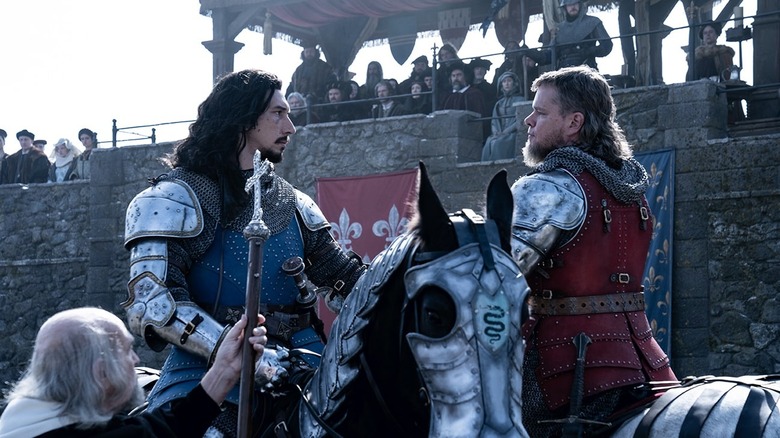The Last Duel Review: Chivalry Was A Myth
In Ridley Scott's "The Last Duel," the first of two Adam Driver-led features on the schedule for this fall, there is a line of dialogue so potent and blatant in cutting to the story's core that one can feel the Leonardo DiCaprio "pointing at the screen" meme buzzing just outside the picture's frame. It's spoken by Nicole de Buchard (Harriet Walter) to her daughter-in-law Marguerite de Carrouges (Jodie Comer), in regards to the moral quandary the younger woman finds herself in. "The truth does not matter," de Buchard insists, "There is only the power of men."
A little on the nose for a movie about the last legally sanctioned duel in French history, fought between two former best friends over a rape accusation against the backdrop of the Hundred Years War? Maybe, but it's not like Scott has always made a career out of being the subtlest guy in the room. "The Last Duel" is exactly the sort of brawny, textured screed Scott, as a visual storyteller, is so well suited for. It is a timely, engrossing, and exhilarating watch bolstered by a sharp script, killer performances, and the usual amount of fire and flair from a filmmaker who has spent decades making this kind of picture seem effortless.
But it is also a film poised to inspire a truly noxious online discourse surrounding its narrative and themes, both from purposely bad faith readings of the text and just the general decline in the way morality is discussed in mainstream cinema. Whether or not such post-game scuttlebutt affects the film's chances as awards season moves into full swing remains to be seen, but for all its thorny material, "The Last Duel" certainly feels like a triumph. If the forthcoming "House of Gucci" is even close to this compelling, this will prove to have been Scott's best year in decades.
That's not how I remember it...
Based on a true story, the film follows the tale of Jean de Carrouges (Matt Damon) and Jacques Le Gris (Driver), two French squires in the mid-1300s whose friendship is tested when the former's wife, Marguerite (Comer) accuses the latter of rape. But rather than a judicial matter of he said/she said, the accusation must be debated in mortal combat, with God choosing the victor — and thus the truth — at the pointed end of jousting weapons.
The "Rashomon"-esque film is split between four acts: the truth according to each of its three principles, de Carrouges, Le Gris, and finally Marguerite (whose truth is listed as the truth) followed by the titular, climactic duel.
Scott eschews some of the more perspective-driven storytelling tics similarly non-linear, multi-POV films employ, instead treating each individual act like its own film. On a basic level, de Carrouges and Le Gris fought in battle together and are presented across all acts as compatriots with a strong kinship who drift apart due to material circumstances back home away from the bloodshed of their vocations. Within the contradictions of the two men's tales and the revelation of the woman's, Scott presents a vivid and surprisingly puerile deconstruction of the feudal way of living.
In de Carrouges' tale, he sees himself as a towering, chivalric hero, loyal to King Charles VI (Alex Lawther) and doting to his wife Marguerite. What he lacks in riches, social stature and respect from his peers, he makes up for through grit, brutality and honor. His struggling financials and inability to sire an heir are mere betrayals of luck, particularly given Le Gris, who finds favor in their lord Count Pierre d'Alençon (Ben Affleck), seems to reap the benefits he himself can never grasp.
But Le Gris sees things differently. In his tale, de Carrouges is a fool with poor money managing skills that no one likes because, as Pierre puts it, "he's no fun." Away from the war, de Carrouges can barely function in feudal society, but Le Gris, learned and good with reading and numbers, possesses a social currency that endears him to Pierre, as well as the many, many women the two fornicate with together behind Pierre's pregnant wife's back. So, when he encounters Marguerite, he thinks she is just like every woman he has bedded before: someone enraptured by his charm but who must protest his advances to remain ladylike.
There's only a few key moments we see play out multiple times, focusing less on the ways specific interactions read from the differing viewpoints and more on the ways each character sees themselves as the hero in their own story, no matter how much of a stretch that is for some of them. We see the rape itself from Le Gris' perspective and Marguerite's, but even in the sugar coated, self deluded version of the perpetrator, it's clear how wrong he is. But his version of events is mirrored, visually, by a parlor game he plays at one of Pierre's bacchanals earlier in the film, showing how everything is a game to him under the umbrage and protection of their lord.
By the time Marguerite's account is presented, we see this world and its decade-spanning story from an entirely new vantage point. Earlier moments of Le Gris' overt charm are undermined by the gossip of Marguerite's friend circle. The sense that Marguerite's trauma might be in some way unique are dashed by her mother-in-law scolding her for thinking she's any better or more important than the countless women this has happened to before, including herself. What initially seems like a chivalric courtroom drama of de Carrouges and Le Gris' conflicting accounts to the king devolve into a hideous and public humiliation for Marguerite, aided by her closest friends and confidantes.
The film strikes a unique tone, thanks to its surprising screenplay penned by Damon, Affleck and underrated writer/director Nicole Holofcener. Initially touted as a reunion for the "Good Will Hunting" scribes, Affleck smartly abdicated the role of Les Gris to the superiorly suited Driver, taking up the more colorful and scenery-chewing supporting part instead.
But Holofcener's pen is absolutely necessary for blending this boy's game approach to historical fiction with the much-needed perspective that makes Marguerite's account so stirring and impressive. Damon and Driver bring a lot to their roles, but Comer is the obvious star of the show, cementing herself as a true contender among her peers in bringing Marguerite's story to life.
This is an era when a woman, accusing someone of rape, could be questioned about whether she enjoyed the act more than the sex she has with her husband, since she hasn't conceived an heir for him and the pre-scientific posited that the conception of children requires the mother to achieve orgasm. On a surface level, we're meant to draw parallels from this horrendous display to the current state of post-feminist society, where the progressive gains don't seem nearly as profound as they ought to.
But "The Last Duel" doesn't function quite as well as a polemic. it is, after all, a Ridley Scott film. And that title...
There can be no winner
Anyone wondering why Ridley Scott would want to make a contentious historical drama with obvious #MeToo implications in 2021 would be right in assuming it was because he wanted to film the hell out of the story's final fight, even if they would be wrong in forgetting that before he ever made "Gladiator," Scott helmed both "G.I. Jane" and "Thelma & Louise."
When the final standoff begins in earnest, every pretense and deception has been wiped away, leaving two combatants who are both absolute scoundrels, impossible to root for one way or the other save for the fact that a de Carrouges defeat will mean Marguerite will be burned alive for a false accusation.It seems a difficult task to even watch this bit of spectacle, until it actually kicks off, and the viewer will feel silly for doubting that Scott would lens the hell out of this fight, one of the most intense and captivating sequences he's filmed in his storied career. Sure, it's hard to make a movie that's critical of an outdated system for treating women as property and hand-to-hand combat as the work of God while making the climactic manifestation of those ideas so thrilling and pulpy.
But that's when "The Last Duel" works the best: Not in teary-eyed handwringing at the evil that men do and the systemic structures of power that enable them to do so, but in the darkly comic pop art of subverting the historical costume drama into a sort of medieval Monday Night Raw.
"The Last Duel" is a raw, unnerving soap opera that spends its runtime hyping up a title fight between two clear heels that we cannot take our eyes off, not just for fear of our only heroine's safety and absolution, but because all of the frustrations and disgust that build up throughout need a release valve. It is a movie that will make you so mad that the only real way to pay off that anger is to see two undebatable monsters bludgeon each other to death in front of a bloodthirsty audience that doesn't care one way or the other who is right or wrong. Whether or not that makes an emphatic or resonant enough statement about the progress of gendered power relations across the centuries is a conversation for another time. But is it a compelling motion picture? No need to jump on horseback with a suit of armor to fight over that.


